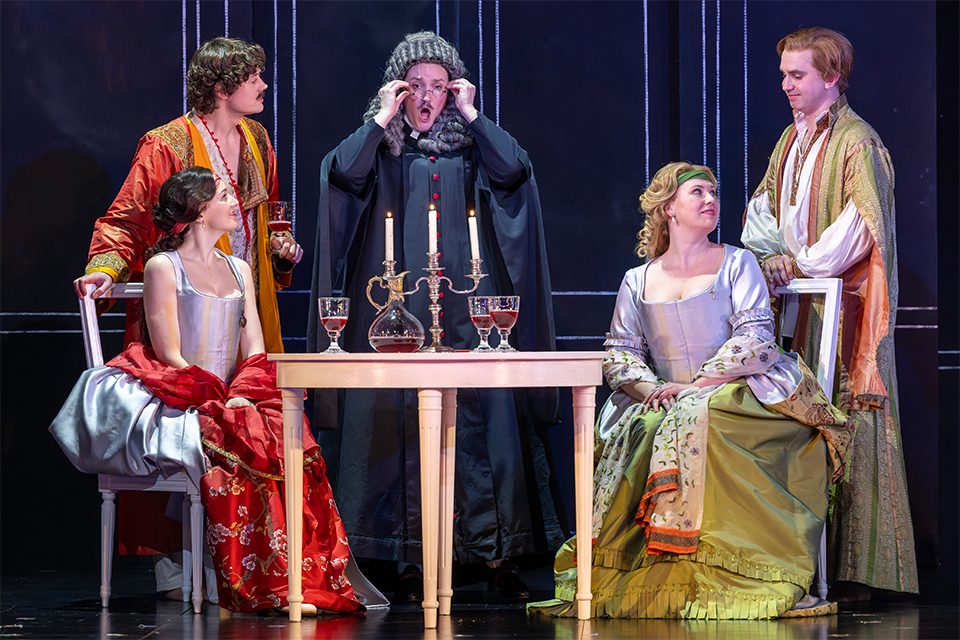Nottingham Theatre Royal – Thursday 7th and Saturday 9th March 2024
Reviewed by Louise Ford
4****
Lessons in love!
I think that when you go to see a classic opera you often have to suspend belief about the plot and often the underlying premise of the story, and simply revel in the glorious music and singing. So here we go!
The libretto of Cosi was written by Lorenzo da Ponte and the score by Wolfgang Amadeus Mozart, it was premiered in Venice in 1790. The current production by Opera North remains true to its roots and is set firmly in the 1700s, the Age of Enlightenment and scientific exploration.
So, the curtains open on a stark stage dominated by the all seeing eye of the camera obscura. The camera obscura, a precursor to the camera, focuses light on a subject
and also presents a reversed image of reality. Our guide and (science )teacher is the sharply dressed Don Alfonso (Quirijn de Lang) who knowingly looks to the audience as he start his experiment in love . He also nods to the orchestra to start the action.
The “eye” disappears and we are drawn into the interior of the box. A stark black room, with white highlights in the form of lines and a few pieces of furniture. All of the action takes place in this restricted, claustrophobic space. The protagonist enter via either hidden doors or by the lift like doors, to great effect. The set which was designed by Tobias Hoheisel, who also designed the costumes, was first used back in 2016 by Opera North.
The costumes in this production are initially pared back and are pale and “boring” for the main protagonists and as the action hots up the colours subtly changes with the introduction of bright colours. Don Alfonso remains buttoned up and daper throughout. Despina who is a splash of colour from the start has some great costume and disguises.
The opera is sung in English, rather than the original Italian, which means that the audience is able to appreciate some of the wittier exchanges more easily, rather than relying on the surtitles. Although the surtitles do come in handy for some of the more complex and fast exchanges!
There was an unexpected last minute substitution as Heather Lowe had been struck down by flu. The role of Dorabella was played by Sian Griffiths. She was light and delicate. She was a seamless replacement and had a rousing round of applause from the audience.
The role of the other sister Fiordiligi was played by Alexandra Lowe. She has a strong and powerful voice and was for me the star of the show.
The hapless lovers are played by Anthony Gregory (Ferrando), in his Opera North debut, and Henry Neill (Guglieme). They have great comic timing and boyish charm.
The role of all seeing, all knowing servant Despina is played by Gillette Butterfield. With her costume changes, she is the audience’s favourite. For some reason her voice didn’t seem to project over the orchestra so at times her singing felt under powered and lost, which was a real shame.
There are some excellent comedy moments; the lift doors opening to reveal the lovers off to war in their Napoleonic great coats and tricorn hats; the arrival of the “mysterious “ travellers from Albania (where else), in their exotic garb. The scene where the”doctor” cures the strangers (who have taken arsenic) with horseshoe magnets, produced with a flourish from the sleeves of her coat, is a highlight of Act 1.
Although my most favourite aria “Soave sia il vento “ sung by Dorabella, Fiordiligi and Don Alfonso, as the lovers set off on their sea voyage, was also a highlight.
All in all it was a great performance and the orchestra conducted with enthusiasm by Clemens Schuldt (he lost a baton at one point) was the cherry on the top of a magical evening of music and romance!

